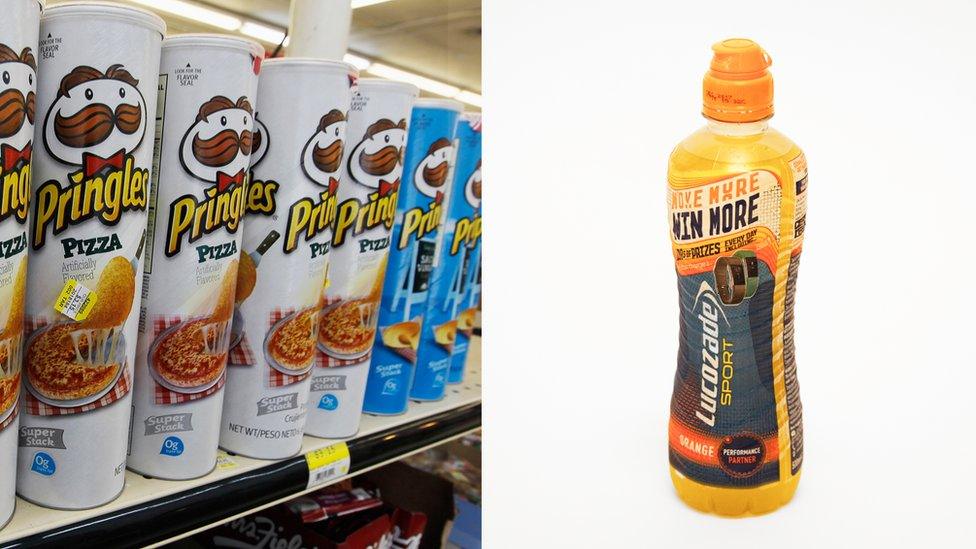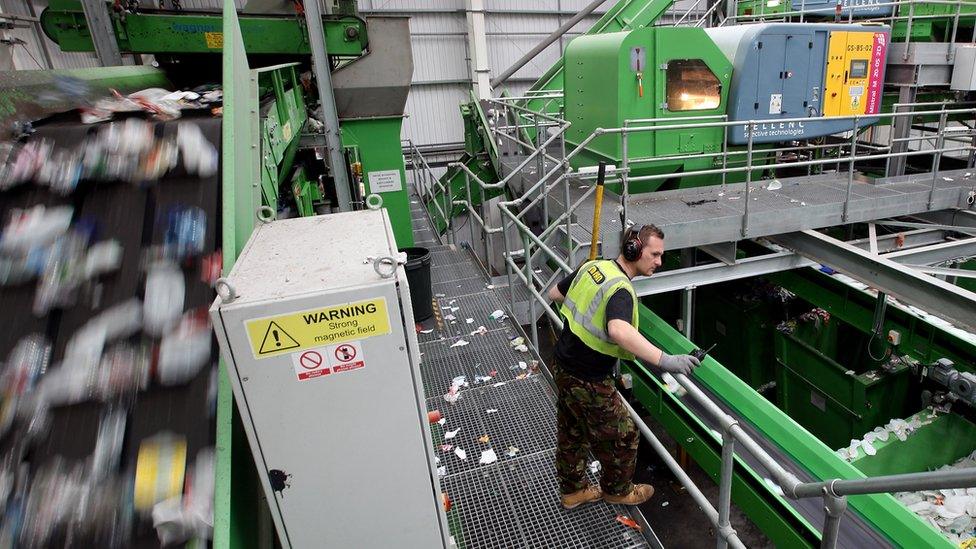Recycling body criticises Pringles and Lucozade packaging
- Published
A packaging design competition is launching to reduce landfill plastics
Pringles tubes and Lucozade Sport bottles are the "villains" of the recycling world, a trade body has said.
The Recycling Association named them in a list of products that pose the biggest challenges for reuse.
The greater the number of materials used in packaging, the harder it is for recycling machines to separate them.
The distinctive Pringles packaging - with its metal base, plastic cap, metal tear-off lid, and foil-lined cardboard sleeve - was said to be a "nightmare".

Lucozade's bottle is recyclable but it is enclosed in a sleeve made from a different kind of plastic.
The waste mountain of coffee cups
Rejected recyclable waste goes up
A $2m (£1.5m) prize for inventors to devise products that are practical and easily recycled will be launched by Prince Charles in London later.
Simon Ellin, CEO of the UK Recycling Association, welcomed the competition, adding: "Improvements are desperately needed in product design."

Simon Ellin's worst recycling offenders:
Pringles (and products with similar packaging): "Number One recycling villain. These things are a... nightmare. Impossible to separate the parts."
Lucozade Sport (and drinks with similar packaging): "Number Two villain. This bottle is so confusing to computer scanners that it has to be picked by hand off the recycling conveyor. Then it often just gets chucked away."
Cleaning spray bottles: "Labels often say the product is recyclable, but that’s only the body. The spray has two or three other polymers and a metal spring. It’s almost impossible."
Black plastic food trays: "Supermarkets think black trays make meat look redder so they colour the tray black but that makes it worthless for recycling. Also, if someone leaves the torn film on the tray, with a bloody card below it, we just have to chuck it anyway."
Whisky packaging: “It grieves me to say this as one who likes his whisky but whisky causes us problems. The metal bottom and top to the sleeve, the glass bottle, the metal cap... very hard for us."

What are your top uses for an empty Pringles tube? Do you have any pictures of your creations? Email us at haveyoursay@bbc.co.uk, external
You can also contact us in the following ways:
Tweet: @BBC_HaveYourSay, external
WhatsApp: +447555 173285
Text an SMS or MMS to 61124
Please read our terms & conditions

So what’s the answer?
Mr Ellin said that, despite the problems with some packaging, consumers should still throw these items in with the rest of the recycling.
The Plastics Economy Innovation Prize, promoted by the Ellen MacArthur Foundation, is split into two sections.
One seeks ideas to prevent the sea being strewn with small plastic items like coffee cup lids, plastic straws and plastic bottle tops. The other seeks innovations in general product design and materials so items are easier to recycle.

The Recycling Association says some packaging can confuse computer scanners
One of the competition organisers, Chris Grantham from the London branch of the global design consultancy Ideo, agreed that Pringles and Lucozade Sport – and brands with similar packaging – were singled out by the industry as almost impossible to recycle.
He listed examples of easily-recyclable products:
Milk bottles: "Britain’s milk suppliers got together and agreed that all plastic milk bottles and caps should be made of the same plastic.
Ringpull can: "When I was a kid the playground was littered with ringpulls that used to cut your knees when you fell.
"Drink Yogurt" - a Japanese yoghurt drink: "The suppliers have made a little groove in the bottle where you can slide your used straw. It stops it blowing away."
In future, Mr Grantham said, designers would need to produce items that could be used again and again as pressure on materials increases from a growing population.
More new thinking is emerging with the growth in online grocery shopping - if the customer has already bought a product like a ready meal online, he says, that product doesn’t need branding.
The technology exists, Mr Grantham says, for a fridge to be fitted with a mini-projector to project branding on a blank container.
One task, he says, is to persuade supermarkets not to copy problematic complex designs.
Get news from the BBC in your inbox, each weekday morning, external

What do the companies have to say?
The Pringles carton is iconic in the world of branding and has been replicated by own-brand retailers in what’s become known as the "Pringleisation" of packaging.
And Kelloggs, the owner of Pringles, said there was an environmental advantage to its design.
“All parts of a Pringles can act as a barrier to keep [the crisps] fresh. That means a longer shelf life, which minimises food waste," a spokesman said.
Lucozade said it was reducing carbon emissions, adding: "We recognise our responsibility to limit our impact on the environment and welcome any technological breakthroughs that support this ambition.”

What can be recycled?

Yes: (but check your individual council's policy as they vary)
Paper: cardboard boxes, newspapers, magazines, envelopes, junk mail, food and drink cartons including Tetra Pak
Plastic: margarine and ice cream tubs, yogurt pots, fruit punnets and ready meal trays
Bottles: drink, shampoo and detergent bottles
Tins and cans: both steel and aluminium, as well as aerosols
Kitchen foil and foil trays
Glass: all colours but no broken glass or ovenware
No:
Tissue and kitchen roll
Plastic wrap, cling film, bubble wrap and plastic bags
Coffee cups
Plastic and paper contaminated with food - including grease-stained pizza boxes (some councils may take clean pizza boxes) and paper food plates
Crisp packets and sweet wrappers
Polystyrene
Nappies
Soft plastic / metallic packaging like pet food pouches
What can be collected from households varies between councils.
Many other items including textiles, electronics, plastic bags and batteries can also be recycled at designated centres and some supermarkets.

Follow Roger on Twitter., external
